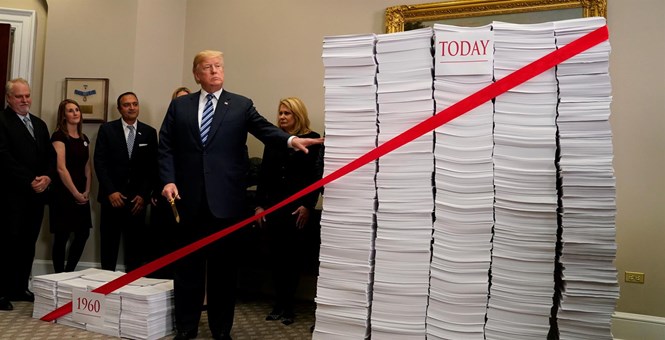Earlier this year I wrote how
the bulk of economic literature … has shown regulation’s overall harmful effects on the economy. Doing more to remove red tape and clear out overregulation would have greater beneficial effects for economic growth.
It’s a case I make frequently. I try to explain how overregulation harms the economy, because those harms are unseen (you can’t witness growth that would otherwise be happening without so much red tape). It’s important for people and policymakers to realize our economy’s true potential.
So I’ve been heartened by the ongoing efforts of President Trump and his administration to get rid of so much red tape.

A Hippocratic approach to regulation
In 2013 I explained why we needed a “sunrise” approach to stop automatically adding red tape to the books to go along with sunset provisions with periodic review:
Ensuring policymakers do their due diligence before imposing rules is taking a Hippocratic approach to regulation — first, do no harm.
Once a regulation is imposed, however, it can linger. As Pres. Ronald Reagan observed, “No government ever voluntarily reduces itself in size. So governments’ programs, once launched, never disappear. Actually, a government bureau is the nearest thing to eternal life we’ll ever see on this earth.”
Doing no harm with regulation necessarily needs an answer to rules going on in perpetuity. Regulations can outlive their purposes, pose unforeseen negative consequences, or otherwise have a pernicious rather than beneficial effect, but they can persist despite it all because of special interests and the difficulty in revisiting them.
These are not theoretical harms, either; regulations impose real costs on businesses (especially small businesses) and impede economic growth. Culling bad regulations is an important pro-growth policy that will lead to greater job creation, investment, and state revenues as a product of a stronger economy.
Neomi Rao, administrator of the Office of Information and Regulatory Affairs in the Office of Management and Budget, writes this week in The Wall Street Journal about “The Trump Regulatory Game Plan.”
Here is a snippet giving the overarching philosophy:
Some regulations legitimately address important health, safety and welfare priorities identified by Congress. The Trump administration respects the rule of law and will not roll back effective, legally required regulations. But in the previous administration, agencies frequently exceeded their legal authority when imposing costly rules. Some agencies announced important policy changes without following the formal rule-making process.
Agencies are now expected to regulate only when explicitly authorized by law—and to follow the proper procedures. The same standards now apply to regulatory and deregulatory actions.
First, do no harm. And it follows that if you are causing harm with overregulation, you cease doing the harm by removing the cause.
Eliminating all this unnecessary red tape is one of the biggest accomplishments of the Trump administration so far. There is an elegant irony to the fact that, like the harms it is removing from the economy, it is also largely going unseen.


